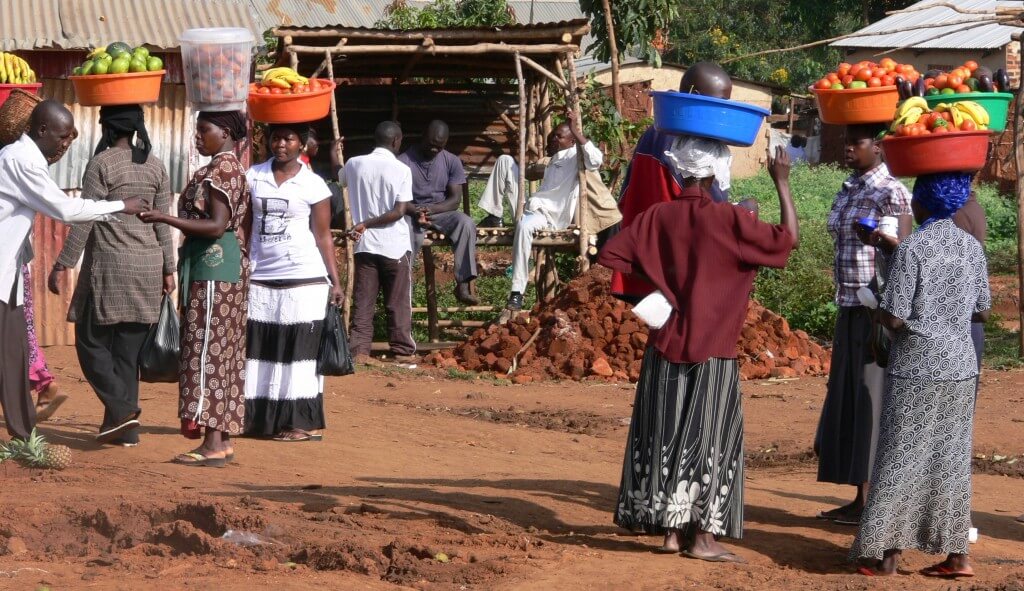They are as much a feature of Africa’s borders as immigration officials, barbed wire and bureaucracy. They are the service stations of Africa’s highways and the pit stops of commerce from Cape Town to Cairo.
They gravitate to the frontiers where trucks stop, truckers break and travelers take on food and water for their journeys. Their shop fronts are brimming baskets and their cash registers are pockets and purses.
They are the women traders who make a living by selling wares at Africa’s myriad borders and TradeMark Africa (TMA) is helping them to get organized, to know their rights and to reap the fruits of East African (EA) integration.
“As cross border traders we carry the ignition key to transform our communities,” said Hadijja Sserwanga, a champion of the rights of Uganda’s border traders, regional Chairperson of the East African Women Cross Borders Traders Association (EAWCBTA).
She describes herself as a politician, activist, teacher and community development worker fighting to overturn the sexual harassment, exploitation and marginalization by the (largely male) people who run and operate EA borders.
She’s been a border trader herself since 1987, operating on the Uganda–Tanzania frontier at Mutukula, and has seen and experienced the problems women traders run into by not knowing their rights under EA integration or being bamboozled into paying unnecessary fines, taxes and bribes because they don’t know better.
“I have a lot of passion for women’s empowerment and being a cross border trader. I feel we can transform ourselves from being small scale cross border traders to well-established formal traders if we work as a group.”
Informal, largely unorganized and unrecognized they might be, but the influence of women border traders on East African commerce is huge. Some studies suggest they are responsible for up to 60% of all intra-East African trade.
A key study on Women in Informal Cross-Border Trade (WICBT) revealed that only 49% of 378 women interviewed at five border posts possessed some post-primary level education even though traders need literacy and numeracy skills to deal with trade procedures and legal requirements.
Many resort to using illegal or “panya” (literally –rat) routes across borders to sell their wares, often unnecessarily. But they know no better and new rules on EA integration and common taxes in the embryonic customs union have yet to trickle down to them.

“East African integration has to be about benefiting the lives of its 140 million citizens, so it is entirely appropriate that TradeMark Africa (TMA) back this initiative to help a key community in the daily business of the region,” said Lisa Karanja, Director of TradeMark Africa (TMA)’s Private Sector/Civil Society Organisation initiative.
“They are women, and therefore vulnerable to sexual exploitation, bullying and physical violence. This would never happen to men. Our women traders are vital cogs in the EA commercial wheel, and that’s why we are helping them.”
The WICBT survey revealed generally low awareness (25%) about the customs union and what benefits accrue to women traders, so many use the panya routes or informal means to get goods across borders, further exposing themselves to exploitation, and going broke.
And it’s not just those who can read and write who get the help. Emphasis is placed on those who can’t and need the most guidance.
“I have learnt that even illiterate women can trade beyond their borders and that business is not just for the literate people,” said Nena Ene Lolosho, a small trader at Namanga on the Tanzania/Kenya border who sells milk, cereals, vegetables, fruits and beadwork
TradeMark Africa (TMA) is investing about $250,000 in a programme partnership with the East Africa initiative for the Advancement of Women (EASSI) to increase access to information, incubate WICBT associations and to lobby institutions for a better trading environment for a key cog in the region’s commercial wheel.
It’s a route that worked for Sserwanga, who spoke about harassment and exploitation in an interview which appeared in Uganda’s daily monitor and which was read by senior police and other officials in her home area of Mutukula.
Suddenly she found herself in discussion with local police chiefs, the District Chief Commander and the Officer in Charge, Criminal Investigation Department, of the Rakia district, a Ms Nakabooza.
“Now she’s attending traders’ meetings to hear first-hand of the problems we face,” said Sserwanga. “It’s a small beginning, but a very significant one that needs to be followed across the region.”















